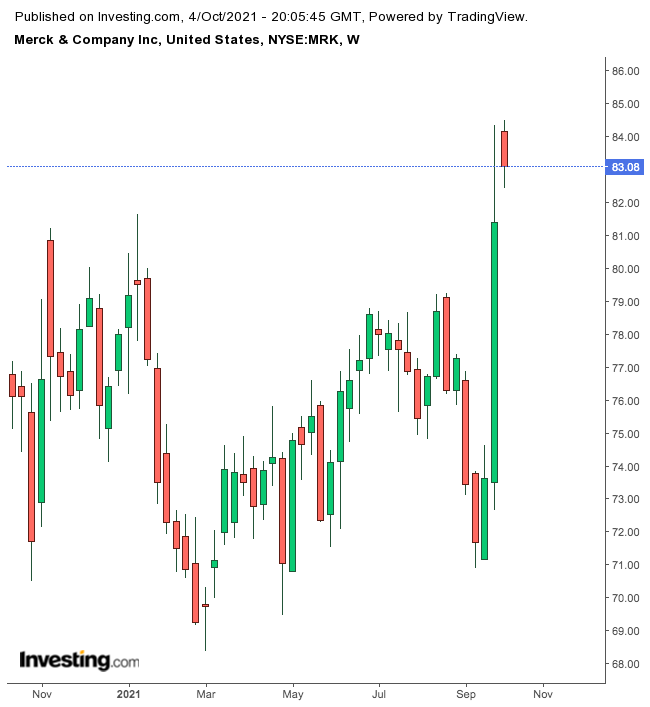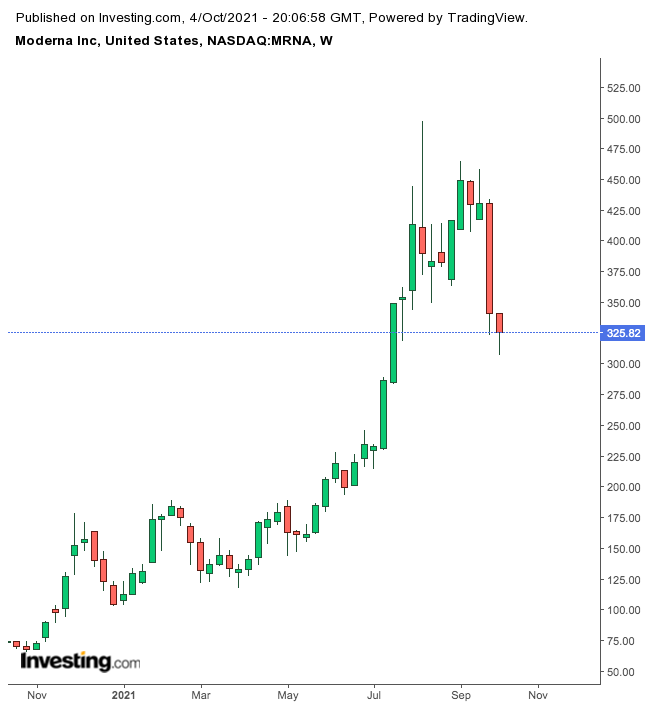Right now, numerous investors looking to take advantage of growth opportunities presented by the global health crisis are changing their stock positions.
Many are dumping Moderna (NASDAQ:MRNA) shares—one of the most successful bets among the vaccine makers—and buying Merck & Company (NYSE:MRK), a pharma stock that till just recently was lagging.
Here's what’s behind this trend along with our view on which healthcare stock is a better buy.
Merck’s COVID Pill
Shares of global pharma giant Merck have surged 15% during the past five trading days after the company announced its new drug molnupiravir, which it is developing with privately held Ridgeback Biotherapeutics LP, reduced the risk of hospitalization or death from COVID-19 by 50% in a late-stage clinical trial.

If it succeeds, molnupiravir would be the first anti-viral pill developed specifically to target COVID-19 to hit the market. The other leading drugs available must be administered in a hospital or infusion center, putting them largely out of reach of all but the sickest patients.
The New Jersey-based Merck plans to ask the Food and Drug Administration for emergency-use authorization in the coming weeks. Merck expects to produce enough medicine to treat 10 million patients by the end of this year and more in 2022.
This potential breakthrough for Merck and its partner came after a couple of failed attempts to find a cure for this global disease. MRK failed twice during the past year in its quest to devise a vaccine. It also scrapped a drug it acquired through a $425-million deal months prior.
More than a third of Merck’s $11.4 billion in second-quarter revenue came from its blockbuster cancer drug Keytruda, and investors are typically wary of drug companies with too high a share of sales from one product, according to a Wall Street Journal analysis.
The U.S. government has agreed to pay Merck $1.2 billion for 1.7 million courses of treatment, or about $700 each, if the company gets FDA authorization. Prior to the trial data, Mizuho Securities Co. analyst Mara Goldstein said molnupiravir could be anywhere from a $1-billion to $10-billion drug, depending on how well it works and what side effects it causes.
At about 15 times this year’s adjusted profit forecast, Merck shares are hardly expensive compared with other healthcare shares. Merck stock closed on Monday at $83.75, after rising about 3%.
Moderna’s Slump
Merck’s potential success is being perceived as a major downside for Moderna, one of this year's most-loved stocks. The shift comes on speculation that a pill to treat COVID patients will reduce the demand for vaccinations. Wall Street analysts had forecast Moderna’s COVID-19 vaccines will bring in more than $20 billion in sales this year, before dropping to $6.1 billion by 2025.
Moderna stock has plunged about 20% since Merck's announcement. The stock closed at $316.36 yesterday, giving the biotech company a valuation of almost $133 billion.

Even before Merck’s COVID breakthrough, Moderna was on a slippery slope over concerns that its shares have become very expensive after a more than 1,500% rally since the start of 2020. Moderna tops the list of S&P 500 stocks that analysts project could fall the most this year, according to a CNBC.com analysis.
Their logic is that in order to solidify its position, Moderna needs to show that its mRNA technology—on which its COVID vaccine is based—is a remedy for other diseases as well, thereby opening additional revenue streams for the Cambridge, Massachusetts-based company. In a recent note an Oppenheimer analysts said:
“We continue to like the underlying mRNA story, technology and management execution. However, a burgeoning valuation has outstripped our current views of the breadth and depth of this promising story.”
Bottom Line
Given Merck’s attractive valuation and the potential for its COVID pill to bring in substantial revenue, its stock is a better bet at this point. After Moderna's 1,500% share increase, the stock is certainly expensive, especially when all the good news is already baked into the price and a competitive threat looms.
